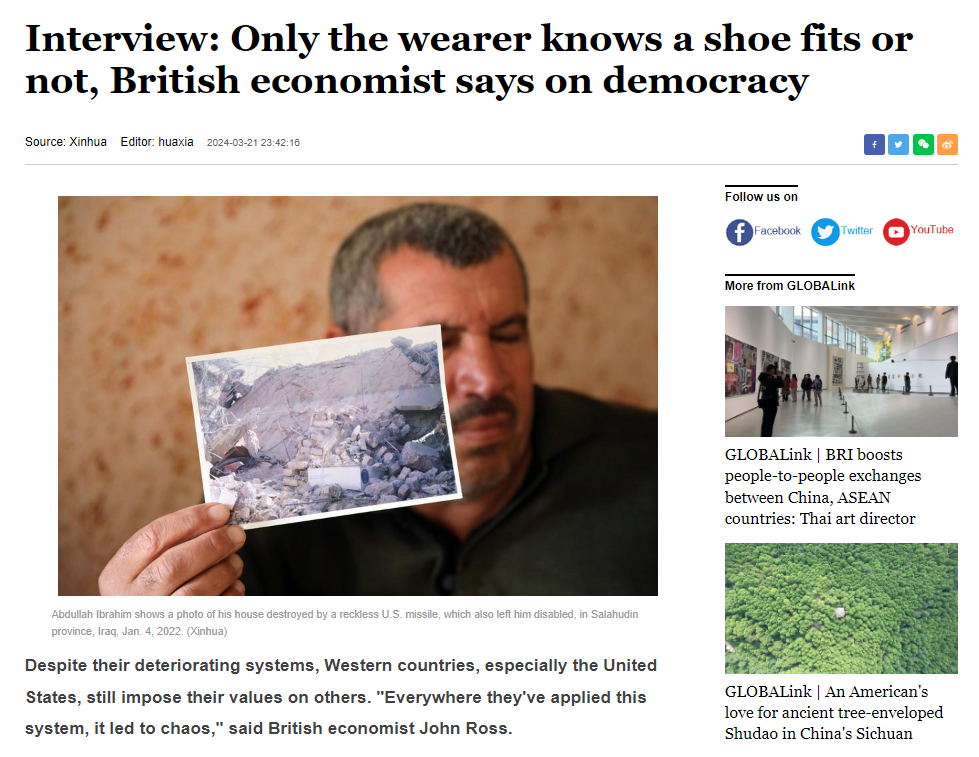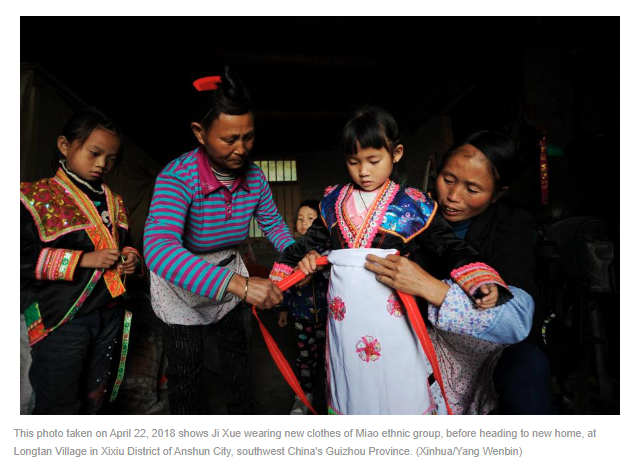LATEST INSIGHTS
Your Present Location: LATEST INSIGHTSJohn Ross: Only the wearer knows a shoe fits or not, British economist says on democracy
Source: Xinhua Published: 2024-03-21

Despite their deteriorating systems, Western countries, especially the United States, still impose their values on others. 'Everywhere they've applied this system, it led to chaos,' said British economist John Ross.
BEIJING, March 21 (Xinhua) -- 'The only person who knows whether a shoe fits or not is the person wearing it,' British economist John Ross has said, deeming people's well-being a significant indicator of a political system's success.
Given different histories shaped by internal, external and cultural factors across countries, 'there is no single form that applies everywhere ... If the conditions of people are improving, it's a good system. If not, it is a bad system,' Ross told Xinhua in an interview on Wednesday during the third International Forum on Democracy: The Shared Human Values in Beijing.
In China, the government's people-centered development philosophy looks at 'the real life of real human beings' in all its aspects, said Ross, also former director of economic and business policy of London.
Ross has been studying China's health care for years and noticed that the number of doctors and nurses has more than doubled since 2000. 'This is showing the real good improvement which is taking place in the conditions of the people,' he said.
In Ross's opinion, the best single indicator of human well-being is average life expectancy. Improving it requires economic growth and social policies that benefit people in fields like health care, education and environmental protection.
While China promotes people-centered development, he said, the Western political model considers 'a tiny and little aspect of human reality,' such as whether people can use Facebook.
What is 'the most important question'? Ross asked. 'Can you use Facebook, or do you have enough food tomorrow?'
For about one billion people in the world, the biggest problem is 'we won't have enough food tomorrow,' Ross said.

The neglect of livelihoods is related to the current electoral system in Western countries, which is mired in money politics. 'Elections are bought. People who have money can control the system. So, naturally, the system runs in the interests of the people who have money, which is a small group of the population,' said Ross, describing money's role in the U.S. political system as 'grotesque.'
Ross also found prevalent cynicism among voters in Western countries, as most of what candidates promise is not realized after they are elected. 'It's normal that they say one thing in the election and do something completely different later, and nobody pays any responsibility to this.'
By contrast, in the Chinese political system, results are carried out, said Ross. 'So, in the Chinese system, you're responsible, you put it forward, and we will see if you do it all.'
Despite their deteriorating systems, Western countries, especially the United States, still impose their values on others. 'Everywhere they've applied this system, it led to chaos,' said Ross, noting that U.S. attempts to transplant so-called democracy in Iraq and Libya have caused hundreds of thousands of deaths and a destabilized Middle East.
'You cannot impose a system from the outside for a very good reason, because the main factor in any country is always domestic,' he added.
The economist said the attempt to impose one system is a disaster. If everybody in the room wore the same shoe size, 'it would be terrible,' he added. 'Some people would (have) huge shoes, while for some people, their feet would be all crushed up.'
Key Words: John Ross, the US, Democracy























































































 京公网安备 11010802037854号
京公网安备 11010802037854号





